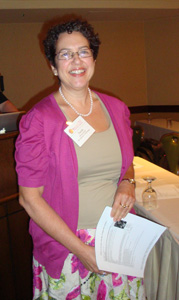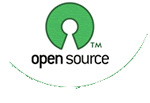Very interesting assignment for students with Wikipedia.
 Mythbusting: college students as Wikipedia editors, a surprising new pathway to information literacy.
Mythbusting: college students as Wikipedia editors, a surprising new pathway to information literacy.
Presenter: Davida Scharf, New Jersey Institute off Technology
Many people could use this technique regardless of the subject matter. She has been working collaboratively with another professor. [watch video Colbert on Wikiality because this is really what some people think of Wikipedia]. This is where she started her journey.
Can we make peace with Wikipedia? as librarians we thought it was great to be able to go online and find it with a question and then now with Wikipedia we hate it because people believe anything that is accessible rather than anything that is factual. She wanted to teach her students how to use it. She used to look up concepts in the Encyclopedia Britannica and not necessarily using it for citation but for understanding concepts. That is what should happen with Wikipedia.
About research papers: students think that it is usually boring, difficult, irrelevant. Professor’s challenge: need motivation for engagement. Librarian’s challenge: need to encourage self-reflection about research skills and sources.
Why Wikipedia? why did she decide to use Wikipedia? because she sees it as authentic. It has motivation and high engagement level. Also the world is the audience.
“The power of the commons is to convert the person from a reader to a writer.” [quotation]
Opportunities for learning – meeting two goals: tecg communications and information literacy through the use of Wikipedia.
Wikipedia assignments:
- evaluate web pages: the first assignment she gives students is an evaluation of web pages. They have to go through the same criteria that she uses.
- write Wikipedia proposal
- edit Wikipedia
- create online multimedia report documenting your work [ppt or video]
- make a case for your grade [what they did right and what they did wrong and students criticze each other and then themselves]
Number 1: Web page critique: access sources, judge tone. Answser questions using evaluation criteria [view UNC handout on print sources; NJIT]
Number 2: proposal: improve wikipedia. Follow W and assignment guidelines. Use sources of good quality, appropriate, tone, scope. Page must stay active until the end of the semester.There are no good or bad sources as long as the source is appropriate to your task. Also sometimes if you put up pages other people remove them or heavily edit them etc. so the page has to stay up.
- why is your topic worthwhile?
- what research will you conduct to verify or document your information [remember that facts are different from opinion and facts must be properly documented and cited]
- see our assessment rubric
The rubric:
- is content substantive?
- well documented
- well connected [with links to other articles such as “see such and such a link”]
- suited to target – [understanding the audience and what segment of the world is interested in your entry]
- demonstrates info literacy
Advice from a librarian: intro to W editing; picking a topic; finding sources; examples. They can get for example four books on Fidel Castro and add to the Fidel Castro entry with citations. That would be a contribution because not everything on him is in W.
A bit about W:
- launched in 2001
- many guidelines [five pillars, what it is not, perfect article]
- back end not transparent
- it has become a topic of study
The five pillars:
- an encyclopedia
- has a neutral pt of view
What it is not? there is a page on W on what it is not.
The perfect article:
- fills a gap
- has a good title
- starts with a clear description
- is not a dictionary article
- is understandable
- is nearly self-contained
- branches in and out
- is unbiased
Weaknesses are strengths: mutability, reliability, anonymity of authors, neutrality. We want students to evaluate and understand the changeability of W. Although anonymity of authors is a liability, yet it is a positive because it frees the students, especially on the discussion page. Some students would engage and ask if they should change something in an article, so they engage with people all over the world and not only with their professor. If you find an article that is not neutral, go fix it. That could be an assignment just for students to recognize bias.
Number 3: report format: post proposed topic
Number 4: oral report-content : it is not about what they put up there but about how they did it and what they learned in the process.
- what: beofre/after
- Who: target audience
- why: reasoning
- how: execution details
- Q and A
- Performance
Examples: Lillian Gilbert; Sustainable architecture; BMW central building; specific weight; vortex power.
Number 5: self reflection
Why do this? student engagement; they really work hard and enjoy the assignment; teaching them research skills etc.
Pitfalls: time management [students have to begin working on it early]; neutrality




Leave a comment